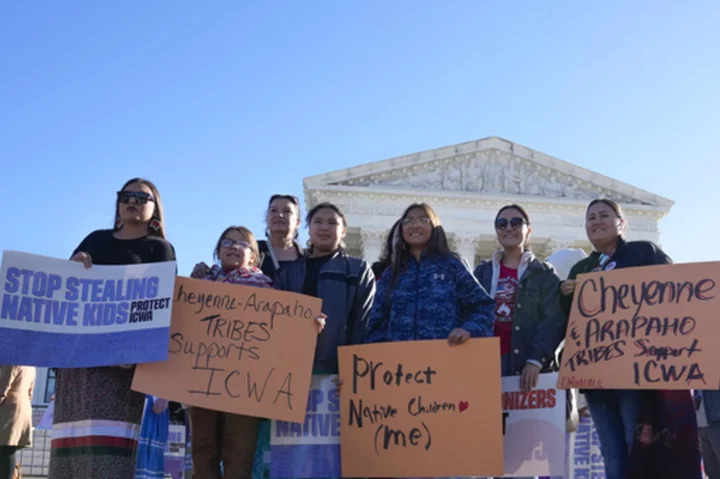Native American nations say the Supreme Court's rejection of a challenge to the Indian Child Welfare Act has reaffirmed their power to withstand threats from state governments.
They say the case conservative groups raised on behalf of four Native American children was a stalking horse for legal arguments that could have broadly weakened tribal and federal authority.
“It's a big win for all of us, a big win for Indian Country. And it definitely strengthens our sovereignty, strengthens our self-determination, it strengthens that we as a nation can make our own decisions,” Navajo Nation President Buu Nygren said Monday.
In fact, the 7-2 ruling released Thursday hardly touched on the children, who were supposed to be placed with Native foster families under the law. The justices said the white families that have sought to adopt them lack standing to claim racial discrimination, in part because their cases are already resolved, save for one Navajo girl whose case is in Texas court.
Instead, the justices focused on rejecting other arguments aimed at giving states more leverage, including sweeping attacks on the constitutional basis for federal Indian Law.
“This was never a case about children,” Erin Dougherty Lynch, senior staff attorney for the Native American Rights Fund, told The Associated Press. "The opposition was essentially trying to weaken tribes by putting their children in the middle, which is a standard tactic for entities that are seeking to destroy tribes.”
Justice Amy Coney Barrett's majority opinion said these plaintiffs wrongly claimed that “the State gets to call the shots, unhindered by any federal instruction to the contrary.”
“This argument runs headlong into the Constitution,” Barrett wrote. "The Supremacy Clause provides that ‘the Laws of the United States ... shall be the supreme Law of the Land.' ... End of story.”
Justice Neil Gorsuch spent 38 pages explaining how up to a third of Native children were taken from their families and placed in white homes or in boarding schools to be assimilated. In response, the 1978 law requires states to notify tribes if a child is or could be enrolled in a federally recognized tribe, and established a system favoring Native American families in foster care and adoption proceedings.
“In adopting the Indian Child Welfare Act, Congress exercised that lawful authority to secure the right of Indian parents to raise their families as they please; the right of Indian children to grow in their culture; and the right of Indian communities to resist fading into the twilight of history. All of that is in keeping with the Constitution’s original design,” Gorsuch wrote.
The ruling leaves an opening for another challenge that could fundamentally undermine the status of federally recognized Native American and Alaska Native nations — the idea that Natives should be treated as a racial group, not as citizens of sovereign governments with rights that derive from treaties, acts of Congress and other federal action.
The conservative Goldwater Institute had invoked “the Constitution’s nearly absolute prohibition on race-based differential treatment” in its brief, saying that the act “imposes a racial category, not a political classification” on adoptees, unconstitutionally treating them differently based “not on their religious, cultural, or political tribal identity, but on genetics.”
But Lynch, whose brief represented nearly 500 tribes, told the AP that “there is nothing racial about the law.”
“There’s no mention of blood quantum, or anything that hints at race. It’s all about citizenship in a tribe,” Lynch said. "If that was to be rewritten and understood by the court as racial in nature, literally every other law for tribes would be racial in nature.”
Attorney Matthew McGill said he'll return to Texas courts on behalf of Chad and Jennifer Brackeen of Fort Worth, who adopted a Native American boy after a prolonged legal fight with the Navajo Nation, and are trying to adopt his 5-year-old half-sister, who has lived with them since infancy.
“We took this case for one reason only: to help our foster-parent clients and their foster children whose adoptions are frustrated by ICWA,” McGill's Gibson Dunn law firm said in a statement to the AP.
But had the conservative groups prevailed, states might have gained more leverage in disputes with tribes over oil and gas pipelines and leases, social services, law enforcement, education, contracting and many other areas now governed by federal laws that define tribes as political sovereigns, Native American attorneys said.
“If Indian Law was just race-based law — if it’s just affirmative action — practically every federal law that’s ever been passed” would be struck down, said Robert Miller, an Eastern Shawnee tribal citizen and law professor at Arizona State University. “You would be stunned — it’s thousands and thousands and thousands of laws.”
Some states have long sought control over tribal matters, and they've been particularly anxious since the court's 2020 McGirt decision clarified that tribal jurisdiction still applies to much of Oklahoma, Miller told the AP. “Oklahoma is in shock now because they found out 43% of their state is Indian Country under the federal definition. So I think that’s a little bit that’s behind all of this.”
The Wisconsin-based Bradley Foundation, known for bankrolling conservative causes, granted $250,000 in 2014 to support the Arizona-based Goldwater Institute’s efforts to “restore the rights of states to exercise their authority to check federal power,” according to its news release.
The case kicked off around 2017, when Gibson Dunn, working pro bono, filed a complaint in federal court in Texas. At the time, the firm was opposing tribal objections to the Dakota Access Pipeline and preparing to win a landmark Supreme Court case that enabled states to legalize sports betting, potentially drawing business away from tribal casinos.
Attorney Mary Kathryn Nagle, a citizen of the Cherokee Nation of Oklahoma, said she considers it no coincidence that groups opposing the pipeline protests of 2016-2017 took a “profound interest in the welfare of Indian children, and decided that this fancy law firm, that invests lots of time and resources into making money from oil and gas companies, all of a sudden really cared about Indian children, and wanted to all of a sudden get involved in custody disputes.”
This was the child welfare act's third Supreme Court challenge, and though Justice Brett Kavanaugh sided with the majority this time, he invited another case with prospective foster or adoptive parents claiming they've been denied equal protection because of race.
Miller thinks Kavanaugh won't get the votes now that Barrett and Gorsuch have so firmly endorsed Indian Law as fundamental to the U.S. Constitution, which he said the founding fathers drafted in part because states were ignoring federal treaties and fomenting wars.
This historical record is hard for “originalists” to deny, Miller said: “There's no principled way they could come to a conclusion that it’s race and not a political relationship with your tribal nation.”
Still, this fight is far from over, “and probably never will be,” said Nagle, whose sister, investigative journalist Rebecca Nagle, explored the case in her “This Land” podcast. “That’s the sad thing about being Indigenous in the United States. Here it is, it’s 2023. And in some ways, we’re still fighting some of the same fights we fought since 1492.”
___
Associated Press journalist Hallie Golden contributed.









